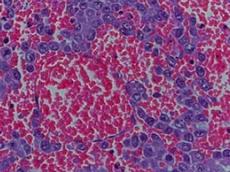Using light-sensitive molecules to combat cancer
Targeted photodynamic therapy can make certain forms of cancer disappear completely. This has been demonstrated by British and Swiss researchers in a paper recently published in the British Journal of Cancer.

The new type of cancer therapy is based on light-sensitive molecules (called "photosensitizers"), which are linked to antibodies. These antibodies specifically recognise tumour blood vessels and can thus be used as "vehicles" for the selective delivery of photosensitizers to the tumor mass. These molecules interact with oxygen and generate reactive oxygen species when they are excited by light, causing irreparable damage to neighboring cells. The chemically modified antibodies destroy the cancer’s blood vessels, thus cutting off its vital supplies of nutrients and oxygen. As a result, large numbers of cancer cells starve and rapidly die, forming a scab which heals in a matter of few days. Importantly, in the experimental systems of the study, tumors did not grow back.
It was at first surprising that even tumor cells with a sufficient access to oxygen and nutrients (e.g., those in the immediate vicinity of healthy tissue) would be killed, thus leading to a complete tumor eradication. The scientists could experimentally show that a component of the body's own immune system (the so called "Natural Killer cells") was essential for achieving complete cures.
More effective therapy in prospect
Some photosensitizers have been in clinical use for a number of years. However, using antibodies as a vehicle to transport light-sensitive molecules specifically to the tumour enables the cancer treatment to be devised more effectively and with a lower dose of photosensitizer and of light. This improves the chances of a cure and may reduce potential side-effects, such as photosensitivity. The researchers hope that the new form of therapy may potentially replace more invasive treatments such as radiation or surgery for certain forms of superficial cancer, such as squamous cell carcinoma of the skin.
“This study paves the way for the development of a new class of antibody therapies”, says Dario Neri, Professor of Biomacromolecules at the Institute of Pharmaceutical Sciences of ETH Zurich. His group has been working on the antibody-based targeted delivery of anti-cancer agents since 1996. Seven antibody products from Neri’s laboratory have undergone further development in collaboration with industry and are currently being tested in phase 1 and phase 2 clinical trials. Indeed, antibody-photosensitizer conjugates could be useful for the treatment of certain light-accessible cancers. Furthermore, the experiments described in the article suggest that vascular-targeting antibodies could be used also for the delivery of other toxic chemical agents (e.g., potent cytotoxic drugs) which may act on disseminated metastases even in the absence of light.
Researchers from the Universities of Zurich and Hull also played a significant role in this study, with the latter involved in synthesizing the light-sensitive molecules. Another participant was the company Philochem AG, an ETH Zurich spin-off focused on development of innovative chemical strategies for therapy and imaging. ETH Zurich and Philochem AG have an active collaboration in the frame of a KTI Project for the development of innovative antibody-drug conjugates, which act at the level of the tumor neovasculature.
Literature reference
Palumbo A, Hauler F, Dziunycz P, Schwager K, Soltermann A, Pretto F, Alonso C, Hofbauer GF, Boyle RW, Neri D. A chemically modified antibody mediates complete eradication of tumours by selective disruption of tumour blood vessels. Br J Cancer. 2011 Mar 29;104(7):1106-15. DOI:10.1038/bjc.2011.78







READER COMMENTS